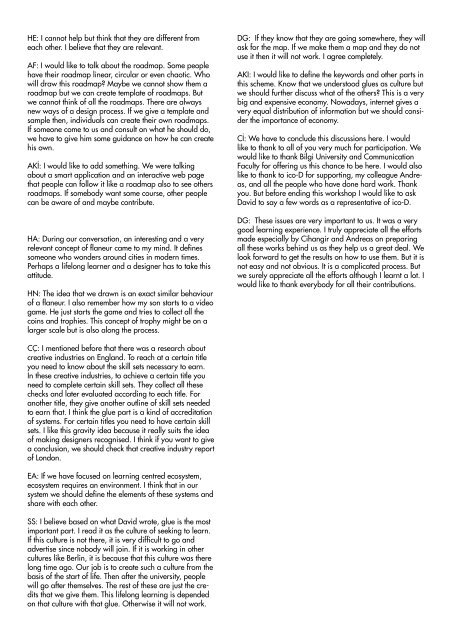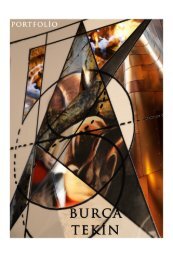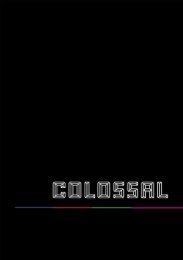BURCA TEKİN - 11535024 -
Create successful ePaper yourself
Turn your PDF publications into a flip-book with our unique Google optimized e-Paper software.
HE: I cannot help but think that they are different from<br />
each other. I believe that they are relevant.<br />
AF: I would like to talk about the roadmap. Some people<br />
have their roadmap linear, circular or even chaotic. Who<br />
will draw this roadmap? Maybe we cannot show them a<br />
roadmap but we can create template of roadmaps. But<br />
we cannot think of all the roadmaps. There are always<br />
new ways of a design process. If we give a template and<br />
sample then, individuals can create their own roadmaps.<br />
If someone come to us and consult on what he should do,<br />
we have to give him some guidance on how he can create<br />
his own.<br />
AKİ: I would like to add something. We were talking<br />
about a smart application and an interactive web page<br />
that people can follow it like a roadmap also to see others<br />
roadmaps. If somebody want some course, other people<br />
can be aware of and maybe contribute.<br />
HA: During our conversation, an interesting and a very<br />
relevant concept of flaneur came to my mind. It defines<br />
someone who wonders around cities in modern times.<br />
Perhaps a lifelong learner and a designer has to take this<br />
attitude.<br />
HN: The idea that we drawn is an exact similar behaviour<br />
of a flaneur. I also remember how my son starts to a video<br />
game. He just starts the game and tries to collect all the<br />
coins and trophies. This concept of trophy might be on a<br />
larger scale but is also along the process.<br />
CÇ: I mentioned before that there was a research about<br />
creative industries on England. To reach at a certain title<br />
you need to know about the skill sets necessary to earn.<br />
In these creative industries, to achieve a certain title you<br />
need to complete certain skill sets. They collect all these<br />
checks and later evaluated according to each title. For<br />
another title, they give another outline of skill sets needed<br />
to earn that. I think the glue part is a kind of accreditation<br />
of systems. For certain titles you need to have certain skill<br />
sets. I like this gravity idea because it really suits the idea<br />
of making designers recognised. I think if you want to give<br />
a conclusion, we should check that creative industry report<br />
of London.<br />
EA: If we have focused on learning centred ecosystem,<br />
ecosystem requires an environment. I think that in our<br />
system we should define the elements of these systems and<br />
share with each other.<br />
SS: I believe based on what David wrote, glue is the most<br />
important part. I read it as the culture of seeking to learn.<br />
If this culture is not there, it is very difficult to go and<br />
advertise since nobody will join. If it is working in other<br />
cultures like Berlin, it is because that this culture was there<br />
long time ago. Our job is to create such a culture from the<br />
basis of the start of life. Then after the university, people<br />
will go after themselves. The rest of these are just the credits<br />
that we give them. This lifelong learning is depended<br />
on that culture with that glue. Otherwise it will not work.<br />
DG: If they know that they are going somewhere, they will<br />
ask for the map. If we make them a map and they do not<br />
use it then it will not work. I agree completely.<br />
AKI: I would like to define the keywords and other parts in<br />
this scheme. Know that we understood glues as culture but<br />
we should further discuss what of the others? This is a very<br />
big and expensive economy. Nowadays, internet gives a<br />
very equal distribution of information but we should consider<br />
the importance of economy.<br />
Cİ: We have to conclude this discussions here. I would<br />
like to thank to all of you very much for participation. We<br />
would like to thank Bilgi University and Communication<br />
Faculty for offering us this chance to be here. I would also<br />
like to thank to ico-D for supporting, my colleague Andreas,<br />
and all the people who have done hard work. Thank<br />
you. But before ending this workshop I would like to ask<br />
David to say a few words as a representative of ico-D.<br />
DG: These issues are very important to us. It was a very<br />
good learning experience. I truly appreciate all the efforts<br />
made especially by Cihangir and Andreas on preparing<br />
all these works behind us as they help us a great deal. We<br />
look forward to get the results on how to use them. But it is<br />
not easy and not obvious. It is a complicated process. But<br />
we surely appreciate all the efforts although I learnt a lot. I<br />
would like to thank everybody for all their contributions.<br />
AGENDA<br />
The concluding diagram reflects the shared understanding in the plenum of the workshop, that Lifelong Learning has a continuing<br />
relevance around people’s life trajectory. Recognizing Lifelong Learning as the glue, that holds a heterogeneous cloud<br />
of Competences, Credentials and Actions, will help developing appropriate curricular concepts to seed, breed, and cultivate<br />
it.<br />
Competences<br />
• Seeding at an early Stage<br />
Imbuing cyclical patterns of observing, understanding, and<br />
knowledge modeling at an early stage in people’s development<br />
prepares the foundation for Lifelong Learning<br />
• Map of Competences<br />
Visualizing experts’ profiles reveals densities, relationships,<br />
and topographies that provide cues not only for navigating/<br />
expanding a personal career but also possible destinations<br />
for those who seek people with specific expertise<br />
• Identifying within Contexts<br />
While framed and certified competences are the building blocks<br />
of formal education, capturing and cultivating skills that<br />
are evidenced through successful acting in various situations<br />
requires adaptive strategies across domains and disciplines<br />
Credentials<br />
• Holding Communities of Professionals to Account<br />
Institutions and associations are tasked to develop and expand<br />
learning opportunities, to establish certification criteria<br />
and valuations, and to promote collaboration across expert<br />
domains<br />
• Badges of Recognition<br />
Credentials as expert currency that can be exchanged to<br />
various denominations and traded across domains<br />
• Patching Gaps left by Formal Education<br />
Competences and professional execution – actions – are held<br />
together by seals of recognition.<br />
Actions<br />
• Building a Culture of Learning<br />
Promote learning how to learn outside of schemes that are<br />
defined by a set curriculum, dedicated facilities, and socially<br />
sanctioned credentials<br />
• Lifelong Learning as Professional More<br />
Design practice is based on continuous explorations and<br />
efforts to advance competences in a wide array of fields<br />
• Engaging in Cycles of Actions<br />
Lifelong Learning is open ended, continuously evolving from<br />
the effective dealing with low-complexity tasks.






